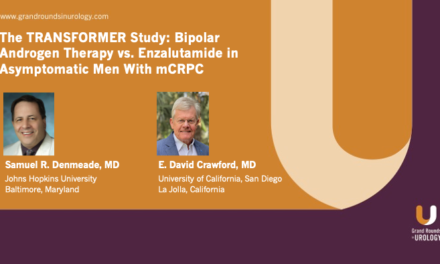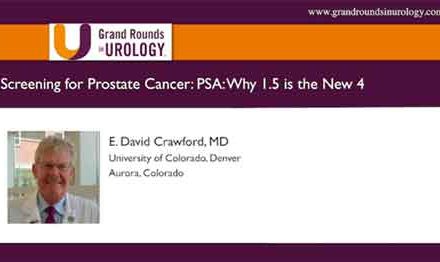Phillip J. Koo, MD, summarizes talks from the session he moderated, called Next Generation Imaging – Focus on PSMA, during the 31st International Prostate Cancer Update in July 2021 in Snowbird, Utah. See below for links to full presentations from the conference as well as related panel discussions.
How to cite: Koo, Phillip J. “International Prostate Cancer Update 2021 Session Review: Next Generation Imaging – Focus on PSMA.” July 2021. Accessed Jul 2025. https://grandroundsinurology.com/international-prostate-cancer-update-2021-session-review-next-generation-imaging-focus-on-psma/
Lectures from this Session:
Next Generation Imaging for Prostate Cancer – Phillip J. Koo, MD, Division Chief of Diagnostic Imaging and Northwest Region Oncology Physician Executive at the Banner MD Anderson Cancer Center in Phoenix, Arizona, gives an overview of the current state of next generation imaging (NGI) for prostate cancer and how it compares to conventional imaging, i.e., bone scans and CT scans.
Current Status of PSMA Diagnostics – Jérémie Calais, MD, MSc, Assistant Professor and Director of the Clinical Research Program in the Ahmanson Translational Theranostics Division of the Department of Molecular and Medical Pharmacology at UCLA, discusses PSMA diagnostics and compares imaging modalities to establish which modality is ideal for prostate cancer staging.
Next Generation Imaging in Prostate Cancer – PYLARIFY – E. David Crawford, MD, Editor-in-Chief of Grand Rounds in Urology and Professor of Urology at the University of California, San Diego, explains how next generation imaging (NGI) can benefit prostate cancer patients and improve care, focusing on PYLARIFY PET/CT.
PSMA PET Imaging at Time of Diagnosis – Peter R. Carroll, MD, MPH, Professor of Prostate Cancer and Urology at the University of California, San Francisco, discusses PSMA PET imaging and compares it to conventional imaging at the time of diagnosis.
Management of Oligometastatic Disease – Robert E. Reiter, MD, the Bing Professor of Urology and Molecular Biology and Director of the Prostate Cancer Treatment and Research Program at the David Geffen School of Medicine at the University of California, Los Angeles, discusses oligometastatic prostate cancer, explaining how to treat it and the long-term benefits of doing so.
Radiation Oncology Perspective: Image-Guided Metastasis-Directed Therapy – Steven E. Finkelstein, MD, FACRO, radiation oncologist with Florida Cancer Affiliates in Panama City, Florida, discusses 3 unique cases of recurrence after robotic-assisted laparoscopic radical prostatectomy and bilateral pelvic lymphadenectomy and their clinical management from a radiation oncology perspective.
Phase 3 VISION Study of 177Lu-PSMA-617 in Patients with Metastatic Castration-Resistant Prostate Cancer – Daniel J. George, MD, Professor of Oncologic and Urologic Medicine and Surgery at Duke University, reviews the results of the VISION phase 3 study of 177Lu-PSMA-617 in patients with metastatic castration-resistant prostate cancer.
Future Trials of Lutetium-177 – Daniel P. Petrylak, MD, Director of Genitourinary Oncology, Professor of Medicine and Urology, Co-Leader of Cancer Signaling Networks, and Co-Director of the Signal Transduction Program at Yale University Cancer Center in New Haven, Connecticut, discusses the future of lutetium-based trials.
Radium-223 Trial Updates – Daniel P. Petrylak, MD, Director of Genitourinary Oncology, Professor of Medicine and Urology, Co-Leader of Cancer Signaling Networks, and Co-Director of the Signal Transduction Program at Yale University Cancer Center in New Haven, Connecticut, discusses radium-223 trial updates, citing combination trials, bone-fracture considerations, and ongoing research.
Integrating Theranostics Into a Group Practice – David M. Albala, MD, Chief of Urology at Crouse Hospital in Syracuse, New York, discusses theranostics and the role it will play in the future of prostate cancer treatment.
Panel Discussion – Focus on PSMA
Phillip J. Koo, MD, Division Chief of Diagnostic Imaging and Northwest Region Oncology Physician Executive at the Banner MD Anderson Cancer Center in Phoenix, Arizona, leads a panel discussion focused on PSMA PET-CT’s expanding role in prostate cancer screening and diagnosis. Jérémie Calais, MD, MSc, Director of the Clinical Research Program of the Ahmanson Translational Theranostics Division of the Department of Molecular and Medical Pharmacology at the University of California, Los Angeles, and E. David Crawford, MD, Professor of Urology at the University of California, San Diego, join Dr. Koo in a conversation that touches on the PSMA ligand production process, whether biopsy is needed to verify PSMA tests, reimbursement for PSMA tests, the future of bone scans, and more.
How to cite: Koo, Phillip J. “Panel Discussion – Focus on PSMA.” July 2021. Accessed Jul 2025. https://grandroundsinurology.com/international-prostate-cancer-update-2021-session-review-next-generation-imaging-focus-on-psma/
Panel Discussion with Cases
Phillip J. Koo, MD, moderates a panel discussion featuring different clinical cases and conversation about how PSMA-PET affects treatment and outcomes. The panel features Peter R. Carroll, MD, MPH, Professor of Prostate Cancer and Urology at the University of California, San Francisco, Jérémie Calais, MD, MSc, Director of the Clinical Research Program of the Ahmanson Translational Theranostics Division of the Department of Molecular and Medical Pharmacology at the University of California, Los Angeles, Steven E. Finkelstein, MD, FACRO, radiation oncologist with Florida Cancer Affiliates in Panama City, Florida, Robert E. Reiter, MD, the Bing Professor of Urology and Molecular Biology and Director of the Prostate Cancer Treatment and Research Program at the David Geffen School of Medicine at the University of California, Los Angeles, and E. David Crawford, MD, Professor of Urology at the University of California, San Diego.
How to cite: Koo, Phillip J. “Panel Discussion with Cases.” July 2021. Accessed Jul 2025. https://grandroundsinurology.com/international-prostate-cancer-update-2021-session-review-next-generation-imaging-focus-on-psma/
Panel Discussion: PSMA and Other Therapies
Phillip J. Koo, MD, moderates a panel discussion focused on the implications of PSMA imaging for other therapies. The panel features David M. Albala, MD, Chief of Urology at Crouse Hospital in Syracuse, New York, Jérémie Calais, MD, MSc, Director of the Clinical Research Program of the Ahmanson Translational Theranostics Division of the Department of Molecular and Medical Pharmacology at the University of California, Los Angeles, and Daniel P. Petrylak, MD, Director of Genitourinary Oncology, Professor of Medicine and Urology, Co-Leader of Cancer Signaling Networks, and Co-Director of the Signal Transduction Program at Yale University Cancer Center in New Haven, Connecticut.
How to cite: Koo, Phillip J. “Panel Discussion: PSMA and Other Therapies.” July 2021. Accessed Jul 2025. https://grandroundsinurology.com/international-prostate-cancer-update-2021-session-review-next-generation-imaging-focus-on-psma/
About The 31st Annual International Prostate Cancer Update:
The International Prostate Cancer Update (IPCU), founded in 1990, is a multi-day CME conference focused on prostate cancer treatment updates with expert, international faculty. It is led by expert physicians and is designed for urologists, medical oncologists, radiation oncologists, and other healthcare professionals involved in the diagnosis and treatment of prostate cancer. The educational activities featured here were presented during the 31st iteration of the meeting in July 2021 in Snowbird, Utah.
ABOUT THE AUTHOR
Phillip J. Koo, MD, is the Chief of Diagnostic Imaging at the Banner MD Anderson Cancer Center in Phoenix, Arizona. Prior to this, he was Chief of Nuclear Medicine and Associate Professor of Radiology at the University of Colorado School of Medicine in Aurora, Colorado. He completed his fellowship at the Harvard Medical School Joint Program in Nuclear Medicine in Boston, Massachusetts. Dr. Koo is a diplomate of both the American Board of Radiology (ABR) and American Board of Nuclear Medicine(ABNM).





